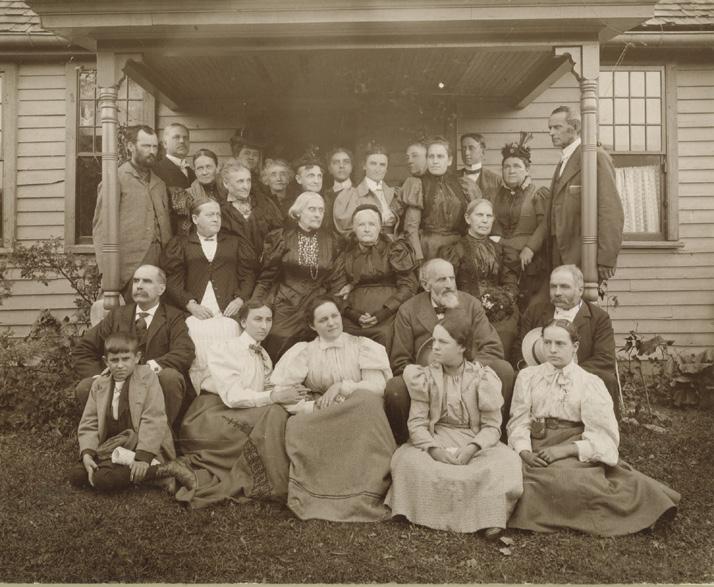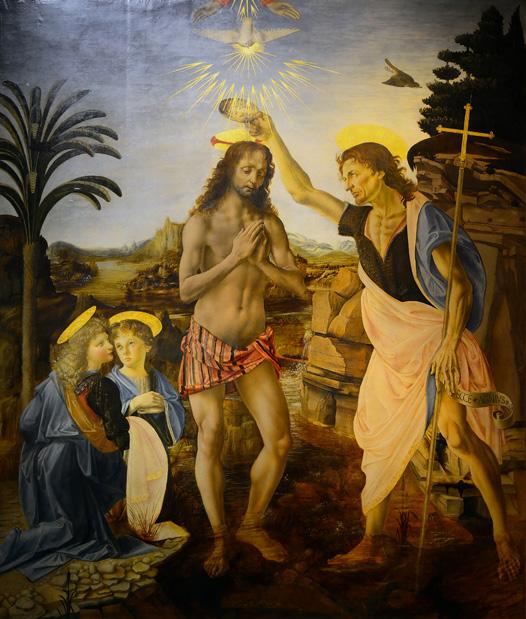
7 minute read
A Letter from the Lateran by Pope Francis 8
Families, of course, come in all shapes and sizes, as in that of Susan B. Anthony in 1896
Christ’s power will thus be manifested in your weakness (cf. 2 Cor 12:9). It was precisely in the midst of the storm that the apostles came to know the kingship and divinity of Jesus, and learned to trust in him.
With these biblical passages in mind, I would like to reflect on some of the difficulties and opportunities that families have experienced during the current pandemic. For instance, the lockdown has meant that there was more time to be together, and this proved a unique opportunity for strengthening communication within families. Naturally, this demands a particular exercise of patience. It is not easy to be together all day long, when everyone has to work, study, recreate and rest in the same house. Don’t let tiredness get the better of you: may the power of love enable you to look more to others – to your spouse, to your children – than to your own needs and concerns. Let me remind you of St Paul’s hymn to charity (cf. 1 Cor 13:1-3). Implore the gift of love from the Holy Family and reread Paul’s celebration of charity, so that it can inspire your decisions and your actions (cf. Rom 8:15; Gal 4:6). In this way, the time you spend together, far from being a penance, will become a refuge amid the storms. May every family be a place of acceptance and understanding. Think about the advice I gave you on the importance of those three little words: “please, thanks, sorry”. After every argument, ‘don’t let the day end without making peace’. You might also recite together a brief prayer each evening before going to bed, with Jesus at your side.
For some couples, the enforced living conditions during the quarantine were particularly difficult. Pre-existing problems were aggravated, creating conflicts that in some cases became almost unbearable. Many even experienced the breakup of a relationship that had to deal with a crisis that they found hard or impossible to manage. The breakdown of a marriage causes immense suffering, since many hopes are dashed, and misunderstandings can lead to arguments and hurts not easily healed. Children end up having to suffer the pain of seeing their parents no longer together. Keep seeking help, then, so that you can overcome conflicts and prevent even more hurt for you and your children. The Lord Jesus, in his infinite mercy, will inspire you to carry on amid your many difficulties and sorrows. Keep praying for his help, and seek in him a refuge and a light for the journey. Discover too, in your parish communities, a ‘house of the Father’, where there is a place for everyone, with all their problems.
Remember also that forgiveness heals every wound. Mutual forgiveness is the fruit of an interior resolve that comes to maturity in prayer. Christ ‘dwells’ in your marriage and is always waiting for you to open your hearts to him; our human love is weak and needs the strength of his faithful love. With him, you can truly build your ‘house on rock’ (Mt 7:24).
Before concluding, I address a word to young people preparing for marriage. Even before the pandemic, it was not easy for engaged couples to plan their future, due to the difficulty of finding stable employment. Now that the labour market is even more insecure, I urge engaged couples not to feel discouraged, but to have the ‘creative courage’ shown by St Joseph, whose memory I wanted to honour in this Year dedicated to him. I also greet grandparents, who during the lockdown were unable to see or spend time with their grandchildren, and all those elderly persons who felt isolated and alone during those months. Families greatly need grandparents, for they are humanity’s living memory, a memory that ‘can help to build a more humane and welcoming world’.
May Saint Joseph inspire in all families a creative courage, so essential for these times of epochal change. May Our Lady help you to foster in your married lives the culture of encounter that we so urgently need in order to face today’s problems and troubles. Live out your vocation with enthusiasm. Never allow your faces to grow sad or gloomy; your husband or wife needs your smile. Your children need your looks of encouragement. Your priests and other families need your presence and your joy that comes from the Lord!
And please, do not forget to pray for me, even as I daily pray for you.
Fraternally,
Francis Rome, St John Lateran, 26 December 2021, Feast of the Holy Family
On Being A Christian
Tobias Runeson
Being a Christian is, contrary to popular belief, not a matter of unsubstantiated wishful thinking or an abandonment of reason and intellect. In fact, the Christian tradition is by far the greatest intellectual tradition in all of Western society and the arguments for God and the Christian faith are much more comprehensive than most people today might imagine. You might not agree with all of these arguments or find some of them less convincing than others, but if you have discarded Christianity as superficial or groundless, then you have either been deceived or simply not looked closely enough.
Contemporary Deceptions
There are two things that particularly seem to be hindering people of our time from seeing matters of religion and Christianity with a discerning mind. One of them is the concept of scientism, the idea that anything that cannot be proven by application of the scientific method can properly be held as true. The logic of this overgrown reliance on the natural sciences is that since God cannot be seen by looking further into space or by an experiment in a laboratory he simply does not exist. In academic and intellectual circles this concept of scientism has been dispelled for many years, since it is simply self-refuting. The claim that everything within our existence could be established with the scientific method is a philosophical statement and itself impossible to prove by scientific method. This claim itself should thus show that our reality as human beings is subject to more than just proof by the natural sciences. Nonetheless, this illusion of a ‘waterproof worldview’ still seems to persist among us today.
The same could also be said about another self-defeating and equally troublesome concept, relativism. This idea claims that there is no such thing as an absolute truth and that what might be true to you might not necessarily be true to someone else. The fact that this statement itself is a claim of absolute truth seems to go unnoticed by those who hold to this view as they fail to see the inconsistency of their claims. The validity of relativism as an intellectual position is untenable, but it has a significant hold on the minds of many people; truth can be relative much of the time, but also absolute when it suits us.
As Christians, however, we believe that it is not just possible, but absolutely crucial, to make claims as to what is true. That should obviously be done in a peaceful and respectful manner, but there is great power in asserting the reality of our existence and freedom to be found in doing so. This pursuit of truth, however, strikes at the heart of the big questions of life and comes with far-reaching consequences for anyone who dares to approach these matters. Many people, when faced with the weight of the

The way into the Church, of course, is through Baptism
Christian argument, fail to understand its implications in a balanced way, not because of the theoretical considerations themselves, but because of the practical consequences that would be involved for their personal lives. If there is a God, who is the source of our life, that means that we are not just accountable to ourselves but also to God. For other people, it might involve both changing their perception of what being a Christian is and their aversion to identifying themselves as such. In these instances, the intellectual smokescreen of scientism or relativism may perhaps seem to offer a convenient evasion.
The Realms of Faith and the Nature of God
Whatever your stance is on faith and religion though, the fact is that in the face of life’s big questions we are all ‘believers’ of a sort. When dealing with matters such as God’s existence, how mankind came into being or what happens when we die, none of us can fully know. To claim that a religious person in that context is someone who abandons reason and intellect and settles for the ‘lesser grounds’ of faith and belief is a misunderstanding of the nature of faith. A better understanding would be that it is not something that replaces reason and intellect, but rather that it takes over when we reach the boundaries of our limited intellectual capacities. There are aspects of our existence as human beings that simply go beyond our ability to fully grasp and leave us in the hands of faith. That does not make us unreasonable, but reflects the nature of our existence. Just because something is beyond our grasp to fully understand does not make it impossible to believe. A dog does not understand the full nature of his master and his master’s dealings in many situations, yet that does not disprove the existence of the










